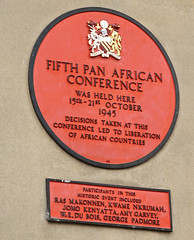W.E.B. Du Bois
Commemorated on 2 plaques
Fifth Pan African Conference was held here 15th - 21st October 1945. Decisions taken at this conference led to liberation of African countries. Participants in this historic event included Ras Makonnen, Kwame Nkrumah, Jomo Kenyatta, Amy Garvey, W.E. Du Bois, George Padmore
Chorlton Town Hall, Chorlton-on-Medlock, Cavendish Street, Manchester, United Kingdom where they was
W.E.B. Du Bois (1868-1963). African American scholar, educator, and activist. A founder of the NAACP. From 1896-1897, he lived in the College Settlement House at 617 Carver (Rodman) St. while collecting data for his classic study, published in 1899, "The Philadelphia Negro."
NW corner, S 6th & Rodman Sts., Philadelphia, PA, United States where they was



